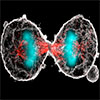 Researchers show for the first time that a DNA polymerase enzyme derived from bacteria makes 10-140% more errors while copying DNA in microgravity. Combined with the known greater rate of DNA damage from space radiation, this inaccuracy of DNA replication is likely to pose a threat to the health of future astronauts on long missions.
Researchers show for the first time that a DNA polymerase enzyme derived from bacteria makes 10-140% more errors while copying DNA in microgravity. Combined with the known greater rate of DNA damage from space radiation, this inaccuracy of DNA replication is likely to pose a threat to the health of future astronauts on long missions.
Nov 29th, 2021
Read more
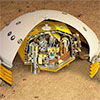 About 1000 days after the Mars InSight mission deployed SEIS, the first seismometer on the red planet, researchers are analyzing new seismic data and reporting on instrument responses, using these data to plan for future planetary seismographs.
About 1000 days after the Mars InSight mission deployed SEIS, the first seismometer on the red planet, researchers are analyzing new seismic data and reporting on instrument responses, using these data to plan for future planetary seismographs.
Nov 24th, 2021
Read more
 B-SURE program aims to develop fundamental understanding of microbial capabilities for bioproduction in space.
B-SURE program aims to develop fundamental understanding of microbial capabilities for bioproduction in space.
Nov 24th, 2021
Read more
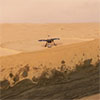 Seismic data collected in Elysium Planitia, the second largest volcanic region on Mars, suggest the presence of a shallow sedimentary layer sandwiched between lava flows beneath the planet's surface.
Seismic data collected in Elysium Planitia, the second largest volcanic region on Mars, suggest the presence of a shallow sedimentary layer sandwiched between lava flows beneath the planet's surface.
Nov 23rd, 2021
Read more
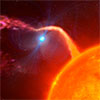 Record-breaking spin rate for a confirmed white dwarf star is observed astronomers. Establishes the star as only the second magnetic propeller ever found, over seventy years since the first.
Record-breaking spin rate for a confirmed white dwarf star is observed astronomers. Establishes the star as only the second magnetic propeller ever found, over seventy years since the first.
Nov 22nd, 2021
Read more
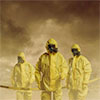 Scientists warn, without good biosecurity measures 'alien organisms' on Earth may become a reality stranger than fiction.
Scientists warn, without good biosecurity measures 'alien organisms' on Earth may become a reality stranger than fiction.
Nov 17th, 2021
Read more
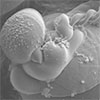 Mars explorers searching for signs of ancient life could be fooled by fossil-like specimens created by chemical processes, research suggests.
Mars explorers searching for signs of ancient life could be fooled by fossil-like specimens created by chemical processes, research suggests.
Nov 17th, 2021
Read more
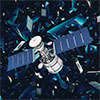 On Nov. 15, 2021, U.S. officials announced that they had detected a dangerous new debris field in orbit near Earth. Later in the day, it was confirmed that Russia had destroyed one of its old satellites in a test of an anti-satellite weapon.
On Nov. 15, 2021, U.S. officials announced that they had detected a dangerous new debris field in orbit near Earth. Later in the day, it was confirmed that Russia had destroyed one of its old satellites in a test of an anti-satellite weapon.
Nov 17th, 2021
Read more
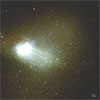 New research outlines a new method to establish the star formation history of a post-starburst galaxy using its cluster population. The approach uses the age and mass estimates of stellar clusters to determine the strength and speed of the starburst that stopped more stars from forming in the galaxy.
New research outlines a new method to establish the star formation history of a post-starburst galaxy using its cluster population. The approach uses the age and mass estimates of stellar clusters to determine the strength and speed of the starburst that stopped more stars from forming in the galaxy.
Nov 16th, 2021
Read more
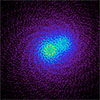 Could life survive around the nearest stars? This project aims to find out.
Could life survive around the nearest stars? This project aims to find out.
Nov 16th, 2021
Read more
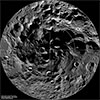 The traps likely contain solid carbon dioxide that could be used to sustain robot or human presence on the moon.
The traps likely contain solid carbon dioxide that could be used to sustain robot or human presence on the moon.
Nov 15th, 2021
Read more
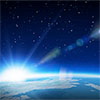 While 1% of anything doesn't sound like much, with light, that's still really fast - close to 7 million miles per hour! At 1% the speed of light, it would take a little over a second to get from Los Angeles to New York. This is more than 10,000 times faster than a commercial jet.
While 1% of anything doesn't sound like much, with light, that's still really fast - close to 7 million miles per hour! At 1% the speed of light, it would take a little over a second to get from Los Angeles to New York. This is more than 10,000 times faster than a commercial jet.
Nov 15th, 2021
Read more
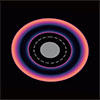 New supercomputer simulations show that after creating a ring, a planet can move away and leave the ring behind. Not only does this bolster the planet theory for ring formation, the simulations show that a migrating planet can produce a variety of patterns matching those actually observed in disks.
New supercomputer simulations show that after creating a ring, a planet can move away and leave the ring behind. Not only does this bolster the planet theory for ring formation, the simulations show that a migrating planet can produce a variety of patterns matching those actually observed in disks.
Nov 12th, 2021
Read more
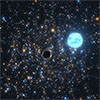 Astronomers have discovered a small black hole outside the Milky Way by looking at how it influences the motion of a star in its close vicinity. This is the first time this detection method has been used to reveal the presence of a black hole outside of our galaxy.
Astronomers have discovered a small black hole outside the Milky Way by looking at how it influences the motion of a star in its close vicinity. This is the first time this detection method has been used to reveal the presence of a black hole outside of our galaxy.
Nov 11th, 2021
Read more
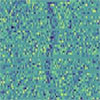 A team of astronomers used artificial intelligence (AI) applied to image recognition. They taught a machine to predict the effect of interactions between planets, making it possible to discover exoplanets that were impossible to detect until now.
A team of astronomers used artificial intelligence (AI) applied to image recognition. They taught a machine to predict the effect of interactions between planets, making it possible to discover exoplanets that were impossible to detect until now.
Nov 11th, 2021
Read more
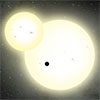 A new technique has allowed scientists to quickly detect a transiting planet with two suns.
A new technique has allowed scientists to quickly detect a transiting planet with two suns.
Nov 10th, 2021
Read more
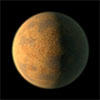 Strange 'eggshell planets' are among the rich variety of exoplanets possible, according to a study. These rocky worlds have an ultra-thin outer brittle layer and little to no topography. Such worlds are unlikely to have plate tectonics, raising questions as to their habitability.
Strange 'eggshell planets' are among the rich variety of exoplanets possible, according to a study. These rocky worlds have an ultra-thin outer brittle layer and little to no topography. Such worlds are unlikely to have plate tectonics, raising questions as to their habitability.
Nov 10th, 2021
Read more
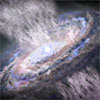 Using data gathered by the Large Area Telescope onboard NASA's Fermi Gamma-ray Space Telescope and a stacking technique combining signals too weak to be observed on their own, researchers detected gamma rays from ultra-fast outflows (UFOs) in several nearby galaxies for the first time, providing a basis for scientists to understand what happened in our own Milky Way galaxy.
Using data gathered by the Large Area Telescope onboard NASA's Fermi Gamma-ray Space Telescope and a stacking technique combining signals too weak to be observed on their own, researchers detected gamma rays from ultra-fast outflows (UFOs) in several nearby galaxies for the first time, providing a basis for scientists to understand what happened in our own Milky Way galaxy.
Nov 10th, 2021
Read more
 Researchers show for the first time that a DNA polymerase enzyme derived from bacteria makes 10-140% more errors while copying DNA in microgravity. Combined with the known greater rate of DNA damage from space radiation, this inaccuracy of DNA replication is likely to pose a threat to the health of future astronauts on long missions.
Researchers show for the first time that a DNA polymerase enzyme derived from bacteria makes 10-140% more errors while copying DNA in microgravity. Combined with the known greater rate of DNA damage from space radiation, this inaccuracy of DNA replication is likely to pose a threat to the health of future astronauts on long missions.
 Subscribe to our Space Exploration News feed
Subscribe to our Space Exploration News feed















